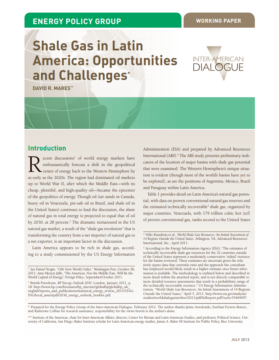The Nationalism of Cristina Fernández de Kirchner
Argentine President Cristina Fernández has increased her appeals to nationalist sentiment to build domestic political support.
The use of natural gas is on the rise in Latin America as a flexible, reliable, and affordable source of electricity. With lower emissions than other fossil fuels, natural gas can complement variable renewable energy sources as they are integrated into the power grid, enhancing energy security and playing a role in the energy transition taking place across the region.
Meanwhile, one of the most promising sources of natural gas in Latin America, the Vaca Muerta shale play in southern Argentina, has faced a challenging macroeconomic context in recent years that has limited the development of its resources to around 5%. Furthermore, Vaca Muerta faces an uncertain future under new president Alberto Fernández, whose policies regarding its development are still unclear. Natural gas could meet growing domestic power demand and increase Argentine exports while facilitating the ambitious renewable energy targets established by the administration of President Mauricio Macri.
Lisa Viscidi, director of the Energy Program, spoke about the production of natural gas in Argentina and the fuel's role in the country's energy transition on a panel organized by the Organization of American States' Energy and Climate Partnership of the Americas on December 13. The event was the launch of a new National Renewable Energy Laboratory (NREL) report on the present and potential role of natural gas in Argentina, Brazil, Chile, and Colombia.
Argentine President Cristina Fernández has increased her appeals to nationalist sentiment to build domestic political support.
Unless resource nationalism can be made compatible with providing incentives for significant foreign participation, it may be too early to start trumpeting a bonanza for Latin America.
Brazil’s oil and gas and electricity sectors are an important destination for Chinese direct investment.
 Sarah Phillips / Inter-American Dialogue
Sarah Phillips / Inter-American Dialogue

